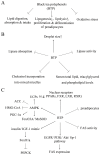Mechanisms of Body Weight Reduction by Black Tea Polyphenols
- PMID: 27941615
- PMCID: PMC6273558
- DOI: 10.3390/molecules21121659
Mechanisms of Body Weight Reduction by Black Tea Polyphenols
Abstract
Obesity is one of the most common nutritional diseases worldwide. This disease causes health problems, such as dyslipidemia, hyperglycemia, hypertension and inflammation. There are drugs used to inhibit obesity. However, they have serious side effects outweighing their beneficial effects. Black tea, commonly referred to as "fermented tea", has shown a positive effect on reducing body weight in animal models. Black tea polyphenols are the major components in black tea which reduce body weight. Black tea polyphenols are more effective than green tea polyphenols. Black tea polyphenols exert a positive effect on inhibiting obesity involving in two major mechanisms: (i) inhibiting lipid and saccharide digestion, absorption and intake, thus reducing calorie intake; and (ii) promoting lipid metabolism by activating AMP-activated protein kinase to attenuate lipogenesis and enhance lipolysis, and decreasing lipid accumulation by inhibiting the differentiation and proliferation of preadipocytes; (iii) blocking the pathological processes of obesity and comorbidities of obesity by reducing oxidative stress. Epidemiological studies of the health relevance between anti-obesity and black tea polyphenols consumption remain to be further investigated.
Keywords: AMPK; anti-obesity; anti-oxidation; black tea polyphenol; lipid digestion; saccharide digestion.
Conflict of interest statement
The authors declare no conflict of interest.
Figures

References
-
- Alwan A. Global Status Report on Noncommunicable Diseases 2010. World Health Organization; Geneva, Switzerland: 2011.
-
- Marmot M., Atinmo T., Byers T., Chen J., Hirohata T., Jackson A., James W., Kolonel L., Kumanyika S., Leitzmann C. Food, Nutrition, Physical Activity, and the Prevention of Cancer: A Global Perspective. ICR; Washington, DC, USA: 2007.
Publication types
MeSH terms
Substances
LinkOut - more resources
Full Text Sources
Other Literature Sources
Medical

